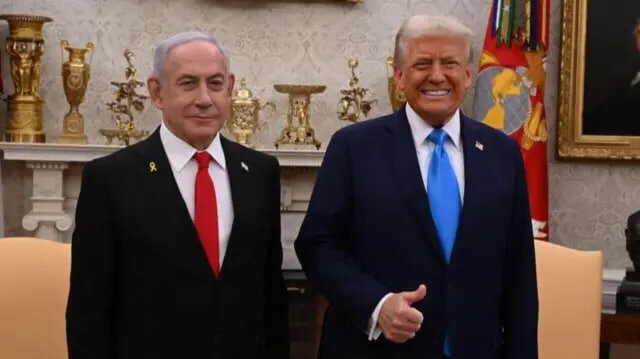INSUBCONTINENT EXCLUSIVE:
Orban, a vocal critic of the ICC
Netanyahu to attend without risk of arrest.This pattern of selective non-compliance with international law set the stage for his United
States visit, where the absence of ICC jurisdiction similarly shields him from legal repercussions.The timing of the trip is significant
It follows a period of heightened tension in the Israel-Hamas conflict, with Israel expanding its military operations in Gaza and facing
starvation as a method of warfare and crimes against humanity such as murder and persecution
ICC warrant dominates international headlines, Netanyahu faces equally pressing domestic challenges, most notably his corruption trial in
As of March 2025, Netanyahu has been embroiled in legal proceedings in Tel Aviv, where he stands accused of bribery, fraud, and breach of
international diplomacy, but they remain a critical factor in his political survival
The trial has fueled protests in Israel, with thousands demanding his resignation and accusing him of prioritizing personal gain over
Critics argue that his foreign trips, including to Hungary and now the United States , are attempts to divert attention from these domestic
pressures and bolster his image as a global leader unafraid of international criticism.Therefore, Netanyahu's visit to Washington can be
seen as a strategic endeavor aimed at addressing several pressing issues that are pivotal to Israel's national interests.Talks on Iran and
Gaza at the center stageBeyond economic concerns, Netanyahu's visit encompasses critical regional security issues
Discussions with President Trump addressed tensions with Iran, the ongoing conflict in Gaza
The urgency of these talks is underscored by the recent deployment of advanced United States missile defense systems to Israel, including
going to talk about the obvious subject
On April 6, 2025, in response to "massacres" by Israel in Gaza, Hamas launched several rockets into southern Israeli cities
In retaliation, the Israeli military conducted airstrikes on targets in Gaza, resulting in the deaths of at least 39 people.According to
reports, Israel has expanded its control over more than 50% of the Gaza Strip by establishing buffer zones
This move has led to widespread destruction of Palestinian homes, agricultural land, and infrastructure
Some analysts have described these actions as potential ethnic cleansing and war crimes.During the meeting, Netanyahu and Trump would likely
discuss a proposed plan for the future of Gaza
The plan involves the relocation of more than 2 million Palestinians from Gaza and the development of the area into a tourist destination
The proposal has faced widespread criticism, with many condemning it as a violation of international law and an act of ethnic
cleansing.Among the actions of opposition against Netanyahu's violent policy in Gaza, the protest demanding a ceasefire in Gaza and a
prisoner exchange deal on his arrival in Washington, DC can be mentioned.The meeting occurred amid growing international concern over the
escalation of violence in Gaza and its humanitarian impact
Human rights activists and international organizations have called for an immediate halt to the violence and the initiation of peace
both the alignment and friction between the two leaders
However, their strategies, timelines, and underlying motivations diverge significantly, raising questions about the feasibility and
employed during his first term, which involved stringent sanctions and a withdrawal from the 2015 Joint Comprehensive Plan of Action (JCPOA)
and friction between the two leaders
However, their strategies, timelines, and underlying motivations diverge significantly, raising questions about the feasibility and
Trump, meanwhile, sees Iran as a destabilizing force in West Asia that undermines United States interests, particularly its oil exports and
During his first term, Trump withdrew from the JCPOA, imposed severe sanctions, and authorized the assassination of Iranian General Qassem
Soleimani, actions that Netanyahu applauded as decisive blows.Despite their alignment on goals, Trump and Netanyahu differ on tactics,
timing, and the role of the United States in any confrontation with Iran
Netanyahu, facing domestic pressure from his far-right coalition partners and a public weary of prolonged conflict, appears eager to
escalate military action against Iran sooner rather than later.Trump, however, has signaled a preference for negotiation over immediate
military engagement, at least initially
In April 2025, he expressed openness to direct talks with Iran, arguing that intermediaries slow down progress
repeat of the JCPOA, which he and Trump both derided as insufficient
launching another West Asia conflict, especially given his campaign promises to avoid foreign wars.Bigger picture, question of
By aligning with Trump and defying the ICC, he seeks to project strength and impunity, but this strategy comes at a cost
Domestically, his corruption trial and public discontent could erode his power base
Internationally, his refusal to engage with the ICC risks further isolating Israel and alienating allies who value multilateralism.The visit
also highlights the fragility of global justice mechanisms in the face of geopolitical power
when confronted with determined resistance from powerful states and their allies
For Netanyahu, the trip may offer temporary relief, but the long-term consequences remain uncertain.As the world watches, the question
remains: Can a leader accused of war crimes and corruption continue to evade justice, or will the weight of international and domestic
pressure eventually force accountability?

